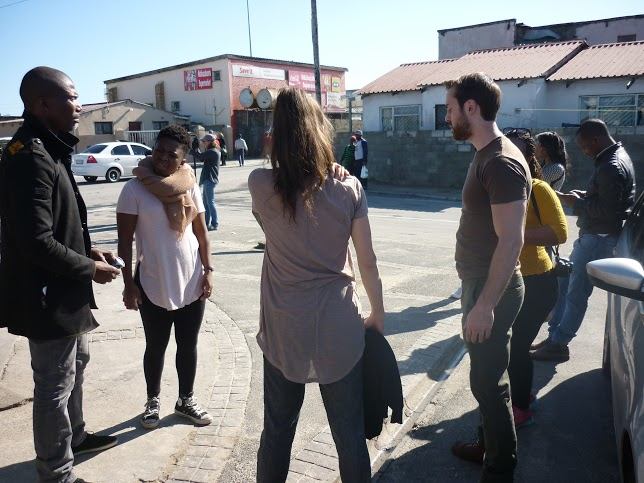
This morning we had the honor of visiting Kayelitsha to participate in the 4th Annual Vuka Mandela Theatrical Magic Event, produced by Theatre4Change Therapeutic Theatre (T3) and its founder Mandisi Sindo.
Kayelitsha is Cape Town’s fastest-growing township. In comparison to Johannesburg, where townships are scattered throughout the metropolitan area, the geographical divide in Cape Town between rich and poor is more severe. Kayelitsha, for example, occupies a belt of land near the airport and well outside the scenic urban center. It may be unnecessary to add that “rich and poor” in South Africa often indicates a racial divide as well: until 20 years ago black South Africans did not have the status of proper citizens and were restricted in all movements of life, including certainly the choice of where to settle and live.
We came to Kayelitsha and this theatre festival on the occasion of Nelson Mandela’s birthday. What that means to people here, and particularly to the community in Kayelitsha, became apparent in the sung invocation, to which the whole audience added their voices.
Theatre4Change operates in a large shed, built more or less like the houses and businesses around it. A wooden frame is covered with sheets of corrugated tin – in this case a pale, seafoam green, like the statue of liberty. On the inside, long red and green mats cover the floor, and black fabric hangs over the ceiling and walls. There is a stage at one end, and a bar had been arranged at the other.
After the show, a man in the audience asked what it was like to come and perform in their space. The actors were quick to point out that we work in many spaces, that our play thrives on whatever each new room offers. I would go further: we are honored to perform in spaces like the Kayelitsha theatre. These are rooms other artists and communities have built, and lived in, and worked in, and placed tremendous value in. And they have invited us to share their homes and participate in the spirit that they have created.
Our main regret from the morning is that we did not budget enough time to hang around and watch more of the shows in the festival.
Here’s a curious point: not a single person who saw Antigone in the US or in Nairobi ever commented on the racial make-up of the cast. The moment we arrived in South Africa, audiences wanted to talk about it.
After this morning’s performance, the first comment was a local actor expressing his gratitude for what he called the colorblind casting of the piece (just to clarify for those dropping in: both Antigone and Ismene, who are sisters, and Kreon and Hamon, who are father and son, are played by actors of evidently different races). Tonight, at our second performance, given for this year’s Mandela-Rhodes Scholars, a young woman took a slightly different tack, announcing frankly that she at first found it difficult to “get past” the casting.
I wonder what precisely is going on there. Kenya, of course, is a more homogenous population, without the same recent legacy of racial strife. And theatre students in New York must by now be quite used to colorblind casting (or “just casting”, as Marcel said). The young people at Casita Maria have grown up in a far more diverse setting than what young South Africans are most likely used to. And few of us living, however bad things are still in America, have experienced what was daily life under the law in South Africa until quite recently.
Then, too, in the case of the Mandela-Rhodes Scholars, they had been spending their entire retreat debating issues of Reconciliation, and so perhaps they were primed for seeing things we do not count as especially remarkable.
We performed for these scholars in a conference room at the Protea Sea Point Hotel, hardly the atmosphere for a Greek Tragedy, or really most any theatrical event. And yet it was one of our strongest performances yet. Certainly it was our strongest talkback: the 40 some brilliant young students leapt eagerly into the fray, throwing the actors more questions than they could possibly answer.
Our own Lunga Radebe, who plays Kreon, is a former Mandela-Rhodes Scholar himself. I asked him afterwards what he thought of the new class. “It’s totally different, man. These students now, they were born after [Apartheid ended]. And so the whole thing is different.”
It is an odd sensation, moving between Kayelitsha and the Sea Point conference room. I would be very much surprised if anyone else had ever performed the same play in those two spaces back-to-back. To hear, from two very different audiences, many of the same responses to the work, was immensely gratifying. The differences, too, are illuminating, mostly in how they reveal divergent perspectives on the state of reconciliation (a topic too large for this post, and in any case something I am not at all qualified to write about).
We left the hotel some time after ten, mellowed on the wine and beer the scholars shared with us (and in my case a sundae cadged off the cart), ready for a long night’s rest and a full day off.

